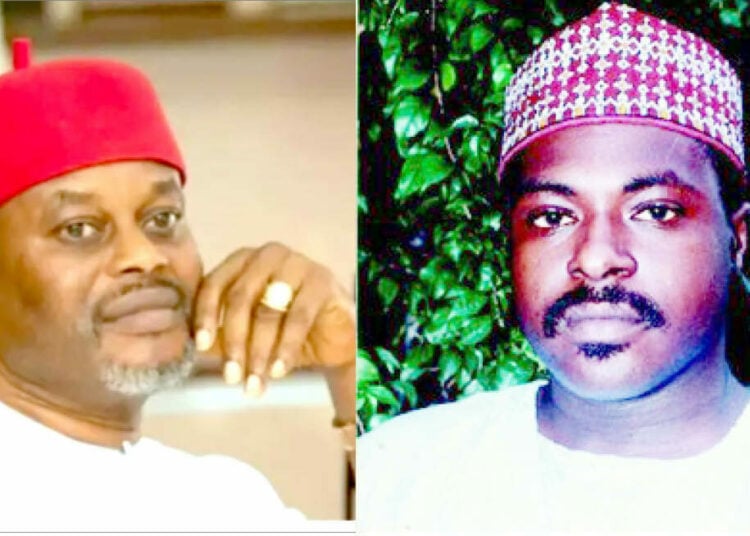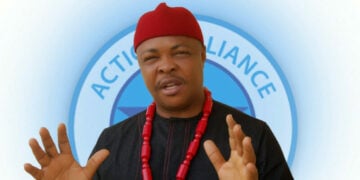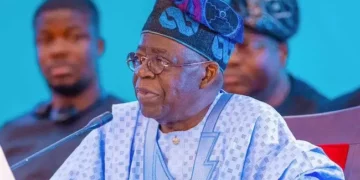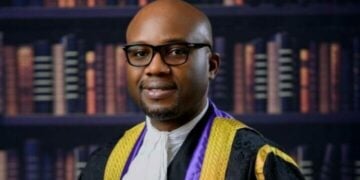Uche Nnaji
Several government officials have had certificate scandals. The most recent involves the Minister of Innovation, Science and Technology, Uche Nnaji.
An online media platform had alleged that the minister forged the University of Nigeria, Nsukka (UNN) credentials submitted to President Bola Tinubu and the National Assembly when he was to be confirmed as minister.
It was alleged that he did not complete his degree programme and that the National Youth Service Corps (NYSC) certificate he presented to the National Assembly and the president was fake.
He has, however, accused Enugu State governor, Peter Mbah, of sponsoring allegations of certificate forgery against him for political reasons.
Speaking through his spokesman, Dr Robert Ngwu, the minister said the accusation was a political witch-hunt by his governor, whom he alleged is planning to join the ruling All Progressives Congress (APC), of which he (Nnaji) is a strong member.
“Mbah wants Nnaji out of the way. He has given a new name to all his problems. He is seeking a second term in office and the only way to achieve this is to get Nnaji out of the way. He wants to join the APC but is fully aware that Nnaji is there. He is not comfortable,” Ngwu claimed.
The spokesman stressed that the minister remains a bona fide alumnus of the university, as he belongs to the July 1985 graduation set. He said Nnaji graduated with B.Sc. Microbiology/Biochemistry, which is also recorded in the institution’s 1985 Convocation Brochure.
Ngwu blamed the inaccuracies on the varsity authorities, pointing fingers at the vice-chancellor, whom he alleged is a member of the Peoples Democratic Party (PDP), and who was being used by Governor Mbah to tarnish the minister’s reputation.
The minister urged the school management to uphold its motto and reclaim its integrity by distancing itself from political interference.
Governor Mbah, however, denied sponsoring a smear campaign against the minister.
UNN authorities, on its part , accepted that Nnaji was its student at the time but that he failed a course, failed to re-sit the paper, and so could not have graduated.
Responding to the scandal, the presidency said it would act after the court determines the case, which is slated for 10 November.
Nnaji had also asked UNN to release his academic transcript to prove his innocence, before resigning on Monday.
However, despite his quitting the cabinet, civil society groups and other Nigerians are calling for his prosecution for the crime of forgery.
Kemi Adeosun
Former Minister of Finance, Kemi Adeosun, was also involved in an NYSC certificate scandal in 2018. She had presented the certificate for clearance to become a commissioner in Ogun State in 2011 and to the DSS in 2015 as a minister-designate.
Trouble, however, started in 2018 after an online media platform alleged forgery, which made her resign for the sake of “integrity”.
In her resignation letter to President Muhammadu Buhari, she alleged that she was born in the UK and was not very familiar with Nigeria until she was 34.
According to her, when she discovered that an NYSC certificate or exemption was crucial for graduates to serve the country, she asked “trusted associates” to help her get an exemption letter since she was above 30, but they ended up giving her one that was not genuine.
“On the basis of that advice and with the guidance and assistance of those I thought were trusted associates, NYSC were approached for documentary proof of status. I then received the certificate in question.
“Having never worked in NYSC, visited the premises, been privy to nor familiar with their operations, I had no reason to suspect that the certificate was anything but genuine.
“Indeed, I presented that certificate at the 2011 Ogun State House of Assembly and in 2015 for Directorate of State Services (DSS) Clearance as well as to the National Assembly,” Adeosun stated.
Dino Melaye
Former lawmaker who represented Kogi West Senatorial District, Dino Melaye, was also involved in a certificate scandal in 2017.
Records showed that the senator graduated with B.A. Geography from Ahmadu Bello University (ABU) Zaria.
Investigations, however, revealed that the university only offers B.Sc. Geography and not B.A. Geography as indicated in the senator’s statement of results.
Melaye’s certificate scandal surfaced in March 2017 when Sahara Reporters, an online media platform, alleged in a tweet that Melaye did not graduate from ABU for his first degree as opposed to his claim of studying Geography in the varsity.
The online platform also alleged that the outspoken legislator bribed his Head of Department to forge his transcript.
An online platform Sahara Reporters said some lecturers in the Geography Department insisted that the senator did not graduate from the department, adding that his name was not on the graduation list because he did not pass the five compulsory courses.
The report trended quickly, but Senator Melaye dismissed the claims and dared the news outlet to sue him if it had genuine proof to support the allegations.
He also boasted that he was studying for his seventh degree at the same university when the report emerged.
Later findings showed that a certain Daniel Jonah Melaye graduated from ABU with a third-class degree and not Dino Melaye.
Similarly, his NYSC discharge certificate, bearing July 8, 2001, has “Melaye Daniel” and not Daniel Jonah Melaye as shown in the B.A. certificate.
Also, his diploma certificate issued by the University of Jos contains Daniel Dino Melaye, while his Senior School Certificate Examination results obtained in 1992 bear Melaiye Daniel Jonah, with Melaye misspelt.
Ademola Adeleke
Osun State governor, Senator Ademola Adeleke, has also faced several allegations regarding his academic qualifications.
His opponents, especially two PDP members, Rasheed Olabayo and Oluwaseun Idowu, had dragged him before an Osogbo High Court, alleging that he falsified his West African Senior School Certificate Examination (WASSCE) results and secondary school testimonial to secure the PDP ticket for the 2018 governorship election, which later ended in a re-run.
Adeleke’s testimonial obtained in 1988 referenced “Ede Muslim Grammar School, Osun State” at a time when Osun State was yet to be created.
As a matter of fact, another testimonial from 2018 appeared to be signed by the same principal who signed the 1988 document, which heightened suspicions.
In court, witnesses said they did not see Adeleke sit for the relevant exams. Nonetheless, Justice David Oladimeji dismissed the case, ruling that the complainants could not prove the forgery allegations.
Unsatisfied with the verdict, fresh accusers—Awoosiyan Olalekan, Ojejade Thomas, and Awodire Sina—filed a suit at the Federal High Court in Osogbo against Adeleke, the PDP, and INEC, renewing the quest for his disqualification, but the Court of Appeal cleared Adeleke, ruling that he has the necessary educational qualification to contest for governorship.
Evans Enwerem
Evan(s) Enwerem, with the support of President Olusegun Obasanjo, emerged as Senate President at the return of democracy in 1999.
He was, however, removed from his position over alleged name and age falsification just five months into his leadership.
His opponents, championed by Chuba Okadigbo, picked holes in the spelling of his name—whether it was Evan or Evans. They alleged that he intentionally falsified his official documents for ulterior motives.
The saga began after the TELL Magazine reported that Enwerem had tampered with his official documents.
A committee was set up to investigate the allegation; Enwerem insisted it was just a typographical error—but hell had been let loose.
The Senate went ahead to impeach Enwerem while he was accompanying President Obasanjo, who was on a diplomatic trip, to the airport, and Okadigbo took his place.
Salisu Buhari
Former Speaker of the House of Representatives, Salisu Buhari, also faced forgery allegations.
In his bid to become a federal legislator, he claimed he was 36 years old in 1999, though he was born in 1970.
According to the 1999 Constitution, the minimum age required for legislators in the House of Representatives is 30.
He also claimed to have studied at the University of Toronto in Canada and graduated with a Business Administration degree, but the university denied the claim, adding that he was never a student of the institution.
Also, for falsifying his credentials to gain admission into ABU, Zaria, he was expelled and could not participate in the NYSC scheme.
The truth came to the fore in 2000 as the defiant Buhari confessed with tears to the nation, admitting forgery and perjury and begging for pardon.
“I apologise to you. I apologise to the nation. I apologise to my family and friends for all the distress I have caused them. I was misled in error by my zeal to serve the nation. I hope the nation will forgive me and give me the opportunity to serve again,” he pleaded.
Stella Oduah
Princess Stella Oduah’s troubles first captured national attention in January 2014 while she served as Minister of Aviation.
Investigations revealed inconsistencies in claims she had made about foreign academic awards, including alleged honorary degrees, and in documentation presented about her NYSC status.
The storm of coverage forced her to resign and prompted multiple inquiries. In later years, the matter resurfaced.
In 2023, prosecutors moved to arraign Oduah on charges related to alleged misrepresentations, and a separate episode involved a lawyer who filed NYSC-related claims in a way that drew official rebuke.
Adams Oshiomhole
Former Governor of Edo State and ex-national chairman of the APC, Adams Oshiomhole, long faced claims that various school documents linked to his early education were inconsistent or forged.
These disputes were most visible in pre-election legal fights and were periodically revived by political adversaries.
What stands out in Oshiomhole’s story is how courts treated the matters: tribunals and appeal courts often found that the suits were improperly framed or were pre-election matters, meaning that the election tribunals were not the right forum to decide—leading to the cases being struck out or dismissed on procedural grounds rather than full factual findings on the documents themselves.
In one notable instance, a tribunal struck out a certificate-forgery case against him on the basis that it was a pre-election matter.
Godwin Obaseki
The controversy around the immediate-past Edo State governor, Godwin Obaseki, came to the spotlight during the lead-up to the APC 2020 primaries.
A party screening panel flagged discrepancies in documents Obaseki presented, notably an NYSC record, and the screening committee ultimately disqualified him from contesting on the APC platform.
While some of his credentials bear Adams Aliu, others carry Adams O. Aliu, while the latest versions bear Adams Oshiomhole.
The NYSC later said it had investigated and issued a corrected certificate, while the governor’s camp said institutional confirmations cleared him.
Courts and INEC made it clear that eligibility and document authenticity are matters for judicial determination, not unilateral party action, and the dispute became one more reason Obaseki left the APC and ran (and won) under the PDP banner.
The NYSC’s public statement that it reissued a corrected certificate was an important development that shifted the political trajectory of the episode.
Ayo Fayose
Former Ekiti State governor, Ayo Fayose’s certificate saga stretches back across several election cycles. Opponents alleged that he submitted a forged Higher National Diploma (HND) certificate when contesting to return as governor.
The allegation moved through the courts as part of petitions and appeals challenging election outcomes.
Critically, the Supreme Court in 2015 dismissed an appeal that, among other things, alleged forgery, effectively affirming the earlier judgments that let Fayose’s election stand.
In practical terms, the highest court’s disposition of the associated petitions meant the forgery allegation did not remove him from office in the cases litigated.
Buhari, Tinubu and Jonathan
Similarly, President Bola Tinubu, former President Goodluck Jonathan, and the late President Muhammadu Buhari were at different times involved in certificate scandals—all in the name of politics.
In the case of the late former President Buhari, in particular, ahead of the 2015 general elections, it was alleged that he did not finish his secondary education and therefore did not possess an SSCE certificate—the minimum qualification to become a Nigerian president. But fed up with the PDP government, many Nigerians—especially opposition supporters—said they would vote for Buhari even if he presented NEPA (electricity) bills as his credentials. And of course, he won the election.





